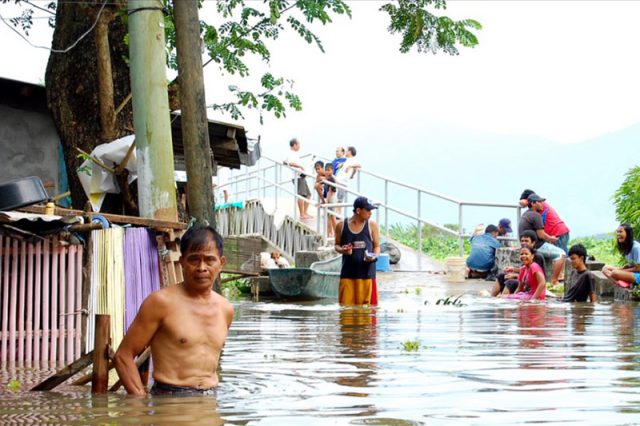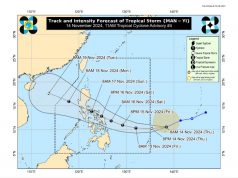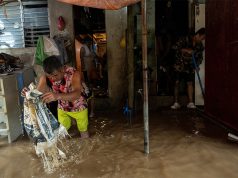
On this day thirteen years ago, Typhoon “Ondoy” (Ketsana) wreaked havoc in Philippines.
Typhoon “Karding” (International Name: Noru) also hit the country more than a decade later.
A science hub called “Science Konek” remembered the natural calamity on a Facebook post on Monday, September 26.
“#OnThisDay in 2009, Tropical Storm #Ondoy crossed Central Luzon and caused historic flooding after pouring an unprecedented amount of rainfall in a short period of time,” the page said.
“On its anniversary, we’re experiencing the brunt of Typhoon #KardingPH in almost the same areas today,” it added.
#OnThisDay in 2009, Tropical Storm #Ondoy crossed Central Luzon and caused historic flooding after pouring an unprecedented amount of rainfall in a short period of time.
On its anniversary, we’re experiencing the brunt of Typhoon #KardingPH in almost the same areas today. pic.twitter.com/tknCRwb1gj
— ScienceKonek (@sciencekonek) September 25, 2022
In another post, Science Konek also remembered Typhoons “Pedring” and “Milenyo,” two severe weather events that happened in September of different years.
The consecutive anniversaries of these weather events are as follows:
- Ondoy – brought heavy rains on September 26
- Pedring – brought storm surges on Sept. 27, 2011
- Milenyo – brought destructive winds on Sept. 28, 2006
“Today, September 25, we’re facing Super Typhoon #KardingPH,” the post reads.
Prior to Karding’s landfall, Ariel Rojas, the resident meteorologist of ABS-CBN, tweeted that the typhoon may affect the same areas similarly struck by Ondoy.
“IMPORTANT: Even with a higher track, #KardingPH may affect almost the same areas affected by Ondoy 13 years ago,” he said.
Rojas also shared a screenshot of Ondoy’s track in September 2009.
IMPORTANT: Even with a higher track, #KardingPH may affect almost the same areas affected by Ondoy 13 years ago.
Factors to consider:
• same geography
• more development and population now
• more damaging winds from Karding
• heavy rains from TC along with Habagat pic.twitter.com/AXw2RPYEiF— Ariel Rojas (@arielrojasPH) September 24, 2022
Based on records, Ondoy dumped one month’s worth of rainfall over Metro Manila and other regions within 24 hours.
It left over 600,000 people affected and took the lives of more than 700 people in the country.
RELATED: Widespread flooding during ‘Ulysses’ onslaught triggers memories of 2009’s ‘Ondoy’
The National Disaster Risk Reduction Management Council reported that the damage due to Ondoy amounted to a staggering P11 billion.
From Super Typhoon to Typhoon
The Philippine Atmospheric, Geophysical and Astronomical Services Administration, meanwhile, raised Karding into a “Super Typhoon” category at 8 a.m. of Sunday after a period of “explosive intensification.”
Back then, Karding packs maximum sustained winds of 185 kilometer per hour near the center, gustiness of up to 230 kph, and a central pressure of 925 hPa.
Many parts of Luzon were also placed under Tropical Cyclone Wind Signal No. 5 on Sunday, the highest TCWS status, to prepare for the impact of destructive winds and heavy flooding.
RELATED: Rundown: Malls offering shelter, overnight parking amid ‘Karding’
By 11 p.m. of Sunday, PAGASA announced that Karding weakened and was downgraded into a typhoon after it made its second landfall in Dingalan, Aurora.
All TCWS No. 5 warnings have also been lifted.
The state weather bureau, however, still placed many parts of Central Luzon and Calabarzon under TCWS No. 3 and 4 on Sunday evening due to strong typhoon-force winds and torrential rains.
Meanwhile, in its 11 a.m. weather bulletin on Monday, PAGASA said that Karding continues to weaken as it moves westward and away from Luzon.
It currently has maximum sustained winds of 130 km/h near the center, gustiness of up to 160 km/h, and a central pressure of 975 hPa.
All wind signal warnings were also downgraded to level 1.
Areas under this TCWS are the central and western portions of Pangasinan, Zambales, the western portion of Tarlac, and the northwestern portion of Pampanga were placed under TCWS No. 1.
NDRRMC has yet to issue an updated situation report on the number of damage and casualties after Karding struck the country.
RELATED: Here’s how you can help victims of ‘Karding’









